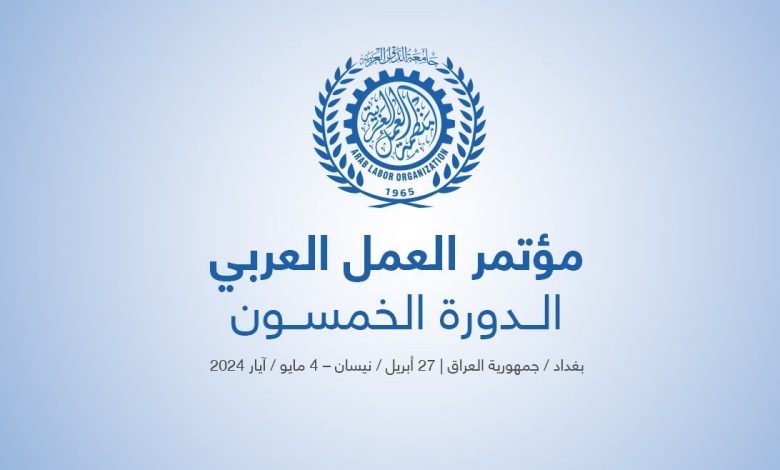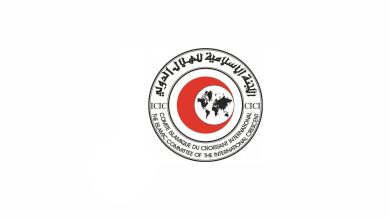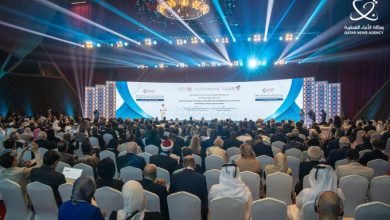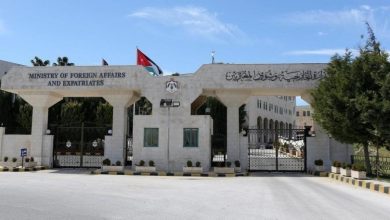
Baghdad (UNI/INA) - Today, Saturday, the activities of the Arab Labor Conference (fiftieth session) began, and the session’s work will continue, under the auspices of Prime Minister Muhammad Shia’ al-Sudani, and headed by the Minister of Labor and Social Affairs, Ahmed al-Asadi, until the fourth of next May.
The Ministry of Labor and Social Affairs confirmed last Wednesday that the Arab Labor Conference will focus on human resources challenges in Arab countries.
The ministry stated in a statement received by the Iraqi News Agency (INA), that “the capital, Baghdad, will host the work of the 50th session of the Arab Labor Conference on April 27, 2024, under the auspices of Prime Minister Muhammad Shia’ al-Sudani, and headed by the Minister of Labor and Social Affairs, Ahmed al-Asadi, and it will continue until next May 4.” With the participation of members of delegations, representatives of the three production parties, to discuss topics that address issues of labor markets and workers in the Arab world.”
Ministry spokesman Najm Al-Aqabi confirmed, according to the statement, that “the session will discuss a group of important items on the agenda, which touch on vital issues that directly affect labor markets and workers’ issues in the Arab world,” pointing out that “among the most important of these items are, It is the Director-General’s report on the future of human resources in light of the technological revolution, and the challenges facing human resources in Arab countries, in light of technological progress.”
He explained that “the report will discuss how to prepare the workforce in the future, with a focus on training and continuing education, to enhance the skills necessary to adapt to technological changes,” noting that “the report will address the balance and integration between technology and the human element, and the impact that technology can have on “Creating new job opportunities and improving working conditions.”
Al-Aqabi stated, “A comprehensive overview of the activities and programs implemented by the Arab Labor Organization in the past year will be presented within its approved plan according to the needs of the three production parties. The session will also highlight the organization’s efforts in supporting member states to confront many economic and social challenges.” Through the various activities implemented that take into account geographical distribution and diversity, through training courses, seminars, forums, and conferences, in addition to the organization’s participation in many Arab and international activities and conferences.”
He continued, “In the second part of the first item, a report on the activities and achievements of the Arab Labor Organization during 2023 will be discussed, in addition to the appendices related to the statutory and constitutional committees, while the seventh item will be reviewed to discuss the normative tool, on new patterns of work, and amending Agreement No. 9 regarding... Orientation, and vocational training.”
He pointed out that “the conference will discuss the eighth item to develop policies to enhance productivity and sustainability in Arab labor markets, and this includes analyzing the factors that will contribute to enhancing the work environment and stimulating economic growth, as well as considering ways to improve and develop policies, and the roles required of the three production parties, and the organization.” Arabic work.
He pointed out that “particular attention will be paid to working on digital platforms, through the technical item, while the ninth item will address the challenges and opportunities related to decent work for young people on digital platforms, as it will include a review of the economic impact of working through digital platforms on young people and its effects on employment, and proposes Measures to ensure the protection of workers’ rights and improve working conditions.”
He noted that “the Arab Organization was established in 1965 at the first conference of labor ministers held in Baghdad, and its objectives were to coordinate efforts in the field of labor and workers, at the Arab and international levels, to develop and preserve union rights and freedoms, and to provide technical assistance in the fields of work.”
He continued, “The Arab Labor Organization includes all Arab countries, and is unique among the other Arab organizations specialized in applying the tripartite representation system (governments, workers, employers), and the conference consists of all delegates properly accredited, with the knowledge of the member states of the Arab Labor Organization stipulated in Article Five - Paragraphs 3 and 4 of the Organization’s Board of Directors,” pointing out that “there are committees emanating from the conference, which are the Organizing Committee, the Drafting Committee, the Agreements and Recommendations Committee, the Membership Accreditation Committee, the Finance Committee, and the Women’s Rights Committee.”
(is over)





